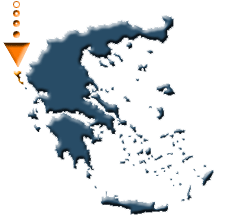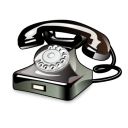Corfu Island
General information about Corfu
Corfu is something you can't understand immediately, but you have to discover it slowly, day after day, as “Feaci” did in ancient times.
Thousand years ago they landed in Corfu with their legendary boats and little by little they started to discover its colours, its perfumes, its sounds and sensations. 
Today you will be impressed by long sandy beaches, marvelous bay, picturesque mountain villages, large olive tree forests and the old town with its ancient stones and hidden lovely places.
You’ll find this and more in a modern island that still seduces the visitors with its charm and its old traditions of a glorious past.
The thick vegetation, the massive number of flowers, the country full of olive trees and the Mediterranean nature all around Corfu island are the result of the abundant winter rains and a sweet climate all over the year.
The hottest months during the summer are refreshed by a nice wind. Winter in Kerkyra, is never very cold, you’ll find in an average temperature of 10/12 degrees daily.
Corfu, called Kerkyra by Greek people, belongs to the Greek Ionian Islands (Corfu, Paxi, Lefkas, Kefalonia, Ithaki, Zante and Kythira) and it is the biggest one after Kefalonia. Between Corfù and the near coasts of Epyrus and Albany the sea is known as “Kerkyraiki Sea” and in the Northern part it is called Aghios Stefanos “stretto” (just 2 Km).
From a geologic point of view Corfu is similar to the near mainland coast.
Corfu’s territory consists of many mountains, especially in the Northern part where the region is characterized by Mt. Pantokratoras.
The North coast of Corfù is very irregular, that’s why here you can find a lot of bay and small promontories, while as you go down to the South you can find a more regular environment with long sandy beaches.
Kerkyra is also surrounded by a great number of small little islands, and we suggest you to visit a special designed section Bordering Islands to get more information about them.
During last years the island of Corfu has seen a great tourist development and can offers today modern structures which still maintain its traditional style.
You will see and appreciate this all over the island, where the hospitality of the inhabitants together with their joy of life will impress you from the first moment of your stay.
Corfu by numbers
Expanse of Corfu’s prefecture: 640 Km² (are included the following islands: Paxi, Antipaxi, Othoni, Erikoussa and Mathraki)
Expanse of Corfu island: 580 Km²
Length: 65 Km
Width: varia tra i 4 ed i 30 Km
Coast surface: 217 km
Highest peak: 911 m (Monte Pantokratoras)
Population: 111.975 abitanti
Number of the towns: 209
When to come
May: The Summer season starts with hot days and fresh evenings.
The island of Corfu is still empty with few tourists and it’s the perfect period to find lonely and relaxing beaches. The sea is mostly flat as there aren't strong winds and Kerkyra has a gorgeous nature full of flowers.
Something very special happen in this period of the year: there is the possibility to admire millions of fire-flies in the countryside during the night!
This is also the right month for those who like to assist to the Greek Easter celebrations.
June: It starts to be very hot and beaches become the perfect place where to stay all day long. Also the temperature of the sea starts to be perfect and the beaches begin to have tourists. This is the best month to sleep in the night!
July: It’s very hot....but a fresh wind called Maistros will save you every afternoon. The tourism starts to be massive and people from all the Europe come to Corfu island to spend their holidays.
In order to sleep well in the night it would better to have the air condition.
August: The same hot weather as in July but with more humidity.
In this month you’ll see Corfu full of tourists, especially from Italy, who fill beaches during the day and night clubs during the night.
This is the ideal month for those who love crowd of people and night life!
September: The weather temperature starts to be nice and the beaches with less
people are perfect in the midday.
There are few rainy days that change into a sunny sky with a beautiful sun.
For the evening we suggest you to have a sweater since the weather is a little bit cold, especially if you like to have dinner under the Greek stars!
Useful telephones
Corfu’s telephone code: 0030 26610 (town)
0030 26620 (south of the island) - 26630 (north of the island)

Police: 39509 / 41203 / 38661
Tourist police: 39503 / 30265
Traffic police: 39294
Hospital: 88200
Emergency: 41000
Port of Gouvia: 91475 / 91376
Nautical Center of Corfu: 30470
Capitaneria di porto: 32655 / 40002 / 33108
Airport: 38694 / 30180 / 38079
Bus station: 39985 / 32185 / 31595 / 30627
Radio taxi: 33811 / 33812
Tourist office: 30625
Post office: 39270 / 25544
Public Phone Society (O.T.E): 49100
Climate
During summer season, from May till September temperatures can change from 23 till 36 degrees and it doesn’t rain a lot. Very often there’s a fresh wind called maestros in all Corfu.
This wind starts normally in the afternoon and follows a North-South direction.
We suggest you to avoid Corfu town during the hottest hour of the day, while it is very nice to visit it during the evening.
 |
May | June | July | Aug. | Sept. | |
| Daily Temperatures | 22 | 32 | 34 | 36 | 24 | |
| Nightly Temperatures | 15 | 20 | 24 | 22 | 16 | |
| Possible rains | 6 | 3 | 1 | 0 | 5 | |
| Relative humidity in % | 60 | 58 | 56 | 60 | 62 |
Getting around the island
OVERLAND
In Corfu you can use a very good bus service that can bring you to all the most important villages (Paleokastritsa, Kavos, Ipsos, Sidari, Gouvia, Kassiopi, Roda, etc...) leaving always from Kerkyra town.
If you own a vehicle the streets will permit you to reach every place, and also the taxi service is well organised.
It’s also very easy to rent bicycles, motorbikes, cars and jeeps everywhere around Corfu.
During your holiday many tour operators will provide you trips by boat or by bus to discover the island.
BY SEA
In the most tourist places there’s the opportunity to rent a boat or to use taxi boat service.
For those who own a boat there are many places where to leave it around the island like Gouvia Marina, North to Corfu town, which is a well organised harbour for small and big boats.
In the city there are 3 different ports: the old port that is small and it's used nearly exclusively from fishings boats, the Mandraki that is under the old fortress and is full of sailing boats (telephone +30 6978892243) and the NAOK the most organised among those three. NAOK is also a nautical club from 1935 and it receives every kinds of boat, for information naok@otenet.gr or +30 26610 30470.
Useful information about Greece
Documents: if you are E. U. citizens no special papers are needed to visit Greece, all the other citizens need their passports and for more information they can contact their embassies or consulates in Greece.
Animals: before being carried to this land they need a health certificate and an antirabic prophylaxis. The certificate should be valid more than 12 months, more than 6 months for cats and it has to be made at least 6 days before arrival.
Health: in Corfu town you can find St. Irini hospital where you can ask for help
showing your sanitary card.
There are many private clinics and doctors who speak English in the city, beyond surgeries and pharmacies in many tourist resorts of the island.
Clothing: only in churches and monasteries proper clothes are required (trousers or long skirts and t-shirts with sleeves).
Some churches supply shawls to the visitor who is not properly dressed just before the visit.
Clock: time in Greece is two hours ahead the Greenwich’s meridian.
Like everywhere in Europe also in Greece, in the Summer season
(March – September) the daylight saving time is effective.
Something curious ... Time in Greece is conceived in a very particular way: here time is not running, there is no such concept of “being on time” and the clock is just something to wear.
The Greeks themselves are aware of taking it easy under every respect (but not in serving the tourist!) up to the point that G.M.T. is not considered as the Greenwich Meridian Time, but as the Greek Maybe Time!
Electricity: outlets in Greece are double and not triple therefore we suggest traveling with an adaptor.
Roads: the island has an efficient road network, with main roads, secondary and no-asphalted ones leading to the most unthinkable places.
The roads in Corfu island are not always in a good condition, so be careful and don’t forget your security belt!
Telephone: there are many public telephone boxes from where it is possible to make telephone calls with pre-paid telephone cards that you can buy in every local shop.
It is possible to make national and international telephone calls even from the OTE’s office (Greek Organization of Telecommunications) open from Monday to Friday from 8:00 to 14:00.
In the office there are also some positions for public use.
The telephone code to call in Greece is 0030.
Money: being as well member of the European Community, the currency in Greece is Euro.
The most famous credit cards can be used in Corfu to pay accommodation, restaurants, rentals... and the traveler cheques can be changed in every bank or exchange office.
Tips in restaurants are not obligatory, it’s up to you.
Antiques: is strictly forbidden to bring out from Greece any kind of antiques without a proper licence.
